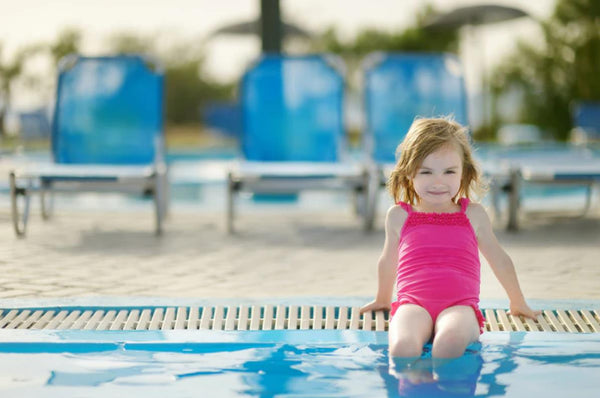How Long Will It Take for My Child to Learn to Swim?
Swimming looks simple, but it requires a tremendous amount of coordination that is sometimes underestimated. Swimming requires controlling every muscle in the body to move smoothly, efficiently, and safely through the water. That's a lot to ask of a young student who may still be growing!

Here are some tips to help students master swimming quickly:
Attend lessons regularly. It is easy for a child to forget their skills over the course of a week. Missing extra lessons each month can lead to regression that is difficult to overcome.
Review the skills needed to master a level. Bear Paddle offers patch rewards for each skill acquired at a level. Collecting these rewards can motivate students, but to gain a skill, deck managers must successfully complete multiple lessons. Missing a lesson can halt progress.
Add a second swim lesson per week or sign up for a swim camp. These additional lessons can take the student to the next level and improve muscle memory and coordination. Can't swim every week? Use drop-in lessons to schedule extra lessons when your schedule allows!
Review your skills at home. Levels 1 and 2 require mastery of skills that can be practiced in a bathtub or pool. If children blow bubbles, pour water over their ears, or float on their backs at home, they may feel more comfortable with swimming lessons.
Try a new coach. Sometimes a new teaching style can help a student understand a skill that was difficult before!
Talk to the pool manager. Pool managers have detailed and individualized feedback for each student and can provide homework, advice, and tutoring to students who are struggling with certain skills.
Ultimately, student progress depends on their learning style, frequency of swimming, and coordination. If you have any doubts about your student's progress or would like to arrange additional swim sessions to improve progress, just stop by the front desk!
Let's take a look at some of the factors that influence the development of a child's swimming skills. These factors can be applied not only to aquatics but also to any other activity you and your children engage in.
1.Avoid Misconceptions
Misconceptions that new parents often have when trying to figure out how long it will take their child to learn to swim can include, "I realized that my child could learn to swim in a few weeks on an accelerated program. He will have learned the basic skills and be more confident in the water. It's like riding a bike: You never forget.
Although there is some truth to these misconceptions, it is not true that learning to swim is a "one-way vaccination." A child can learn many things in a multi-week program, but it takes practice and persistence to maintain them as their body, mind, and even social skills develop. There are some very simple and universal skills they can learn, such as getting into the pool safely and keeping water out of the trachea and lungs. These are basic skills that every swimmer needs and can be learned quickly.
2.Understanding Physiological Factors
Constant repetition is the mother of mastery in almost any activity. Why does practice produce results? One reason is that repetition strengthens the neurological pathways in our brain. These pathways make a movement or reaction natural, fast, strong, and intuitive, and allow our muscles to repeat movements faster, easier, stronger, and more efficiently.
The answer to the question "How long does it take to learn to swim?" is really a matter of repetition creating "muscle memory" and preparing muscles for familiar movements. The more you practice the movements to learn to swim, the less time you will need to answer the question "How long does it take to learn to swim?".
3.Maintaining Coherence
While competitive swimming may not be every parent's goal for their child, consistency leads to lasting results and helps children remember the skills learned in swimming lessons. When children take a break from swimming lessons, it is normal and even expected for them to lose some of the skills they learned while learning to swim on a regular basis.
Continuing swim lessons throughout the year will help maintain and progress. Returning students will need to relearn previously acquired skills and reacquaint themselves with the water.





















